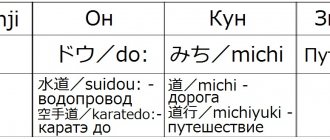One of the imageboard memes superimposed on a frame from the film “Gentlemen of Fortune”
Tian
(Japanese ちゃん) or
chan
(rendered in Russian not in Polivanov) - one of the Japanese nominal suffixes, has a “diminutive” meaning and an element of “lisping”, originally derived from another nominal suffix -
san
(approximate meaning - “dear "). In Russian Internet slang associated with the culture of anonymous people and anime fans, it began to mean simply “girl”.
[edit]Usage in Japan
Women predominantly use this suffix to refer to women (some young women use it to refer to their name in the third person).
Men use -chan
between very close friends or business partners or towards young boys.
As a rule, it is used by everyone in relation to the younger or lower in the social sense, with whom close relationships develop, people whom you have known since childhood. Usually used when adults address children and women within the family, small children to each other (for example: onii-chan
- brother), girlfriends to each other, boys to their beloved girls, simply as an expression of tenderness between very close adults. Can be used in relation to a grandmother or grandfather, corresponding to the Russian diminutives “grandmother” and “grandfather”.
Most parents in Japan call their daughters -chan
throughout their life.
Attaching the suffix -chan
to a boy can develop as a nickname if it is successfully combined with the name by ear, and remains with him at school or in the family.
Pet names often consist of the abbreviated name of the pet and -chan
.
For example, a rabbit ( usagi
) would be called
usa-chan
.
used -chan
fans along with the abbreviated names of their favorite pop and movie stars.
So, Arnold Schwarzenegger has the affectionate nickname Shuva-chan
.
Other nominal suffixes
We have already figured out what “chan” is, now we propose to consider other interesting nominal suffixes. We will not talk about absolutely all of them, but will look at the most common ones:
- Kun. Like the suffix “chan,” the meaning of the word “kun” was distorted by visitors to various Russian-language Internet resources. Among them, the opinion has taken root that Chan is a girl, and Kun is a guy. Again, this is not entirely true. The word "kun" is usually used in an informal setting between friends. It is most often used in relation to male representatives, but when addressing girls, you can also use this suffix without any problems.
- San. This suffix refers to the neutral polite style. If we try to draw an analogy with the Russian language, then the suffix “san” can be compared with the word “you”. It is used by juniors in relation to seniors, colleagues in a business setting, strangers on the street, etc. In a sense, this word is an antonym of the words “kun” and “chan”.
- Herself. In this “suffix hierarchy” this word occupies the highest position. It is very difficult to translate it literally, but in meaning it means “honorable.” It is very rare in the colloquial vocabulary of ordinary Japanese. For example, this is how a representative of the service staff may address his guest. Or this can often be heard when a person waiting in line is read off the list. Sometimes this suffix is used in a sarcastic manner in order to humorously increase a person's social status. Like the word "san", "sama" is most often used in formal speech, such as when writing a letter.
- Sensei. “Sensei” is not only a suffix, but also an independent word. Translated, it means “previously born.” It is often used in relation to teachers, professors, teachers, as well as lawyers, scientists, politicians, etc. Unlike previous examples, the word “sensei” denotes a certain social status, and not just a relationship to a person.
- Dono. This suffix can most often be seen in official documents (such as certificates, diplomas, etc.).
- Senpai. A senpai is someone who is senior in a certain field or specialty. For example, for a first-year student, the senpai will be a second-year student, for a second-year student, a third-year student, etc. But in the eyes of a second-year student, a first-year student will not be a senpai, but a kohai.
- Senshu. Athletes are addressed with this suffix.
[edit] Options
Suffix -chan
has independent variations:
tan
(Japanese たん) - a diminutive and warmer form of “chan”, imitates a child’s pronunciation and is used to indicate the kawaiiness of a person or character, mainly for the names of various mascots and manifestations of moe anthropomorphism;
tin
(Japanese ちん) - an even more diminutive form than “tan”, when addressed directly in public, can be regarded as offensive ridicule and is usually used when discussing third parties behind the scenes;
chama
(Japanese: ちゃま) - used in speech by young children.
Definition
It all started with anime, Japanese animated films. The fact is that, despite their widespread distribution, most adults find it difficult to understand how their peers can watch such cartoons. It doesn’t even help that the plot is not intended for children at all, nor is the content. And naturally, on the Internet, anime fans began to unite on thematic platforms. This is where the expression “chan” came into use among young people. What is this word?
Chan is a prefix for the word "girl" in Japanese. Its closest analogue is “lady” in English. But Japanese similar consoles are more functional. It is often used to address a girl who is younger, the same age, or with whom a person has an informal love relationship. It is not customary to address older women this way. So we looked at the word “chan” (what it is and when it is used).
Gradually, not only anime fans, but also other young people began to use it. Over time, its meaning has become somewhat distorted, sometimes it is even tilted, which is fundamentally wrong. But why not just call a girl a girl? The thing is that “chan” is not just a fashionable word from a foreign language, but also a certain designation of a girl’s characteristics: her beauty, femininity, some cute features of appearance, character. This can be said about a person of the fairer sex who is interested in Japanese culture and cosplay.
In addition to the above, you can now hear another strange expression, often written with the abbreviation TNN. It stands for “chan is not needed.”
[edit] In Russian
In the slang of the anime community, the suffix is -chan
became an independent word as a synonym for the word “girl”.
The somewhat disparaging word “tank” is also used. On imageboards it was transformed into a rougher version of tnya
, which also acquired a plural (tni, tyany), and declensions (tni, tne, tnyu, tney/tney, about tne).
There are also imageboard memes: “I am a chan, there will be no proof”
(that is: “I am a girl, but I won’t provide confirmation of this”),
“There is one chan”
or
EOT
threads (talking about how a girl does not pay attention at all attention to the guy) and a cynical phrase-reaction to such contrition:
“Tyan is not needed”
(as an abbreviation:
TNN
).
[edit] Features of use
It is added as a suffix to the names of girls and children and gives a diminutive connotation.
Can also be used as a separate word to denote a (nice) girl. An illiterate version of “tnya” with the same meaning is being promoted on image boards. It is interesting that in Japanese, but not in Russian, “chan” can also be applied to a small male child who has not “grown up” to kun. The Japanese suffix ちゃん is written as “-chan” according to Hepburn, and “-chan” in Polivanov’s system, which sometimes leads to confusion in pronunciation.
Included in the memes EOT (“There is One Tian”), EOT-TRAD (thread about EOT), TNN (“Tyan Not Needed”), “I am a Tian, there will be no proofs.”
There is an even more diminutive form “-ting”, as well as a derivative form “-tan” to make it even more kawaii and used in naming mascots (for example, Wikipe-tan).
HOW TO FIND YOURSELF A THAN IN 2K20
Tested for myself. works on inexperienced boys under 20 years old. 1. Preparatory stage. Yeah, fuck, you're going to have to clean up your act. Both physically and mentally. Physically everything is clear: hairstyle, acne, mustache, clothes and that’s it. >ARRRAYA VNESHKA RISHAIT Yes, the fucking appearance decides, so it’s important for you to get the most out of yourself. What was meant by morally? It should be a pleasure to communicate with you. Eliminate the following: whining, obsessing over bullshit, tediousness, DOUBT, and so on and so forth. The essence of a woman is that she is a woman, and the essence of a man is that he is a man. If you want to get a woman, act like a man. 2. Company search stage. Delete Tinder and Badu from your phone, delete accounts on all SZ, this is a lost cause. Yes, one in a thousand will be lucky and find his love there, but the other 999 will spend a week, a month, a year there. And all to no avail. What kind of companies are right for you: University classmates, study whores, colleagues at RABOtka, work whores, clubs and sections that people take seriously, find hobbies whore (look for them yourself, whore, not everything can be handed to you on a platter, as an option - the Russian Geographical Society, there you can find yourself a gray mouse). Yes, first of all, you really need to come up and say to the already formed flock of people, hello, I’m new here, let’s get to know each other. If, for example, you just got accepted and there are no companies yet, you need to grab yourself some money, and fucking JUST (I understand that it’s not fucking easy, but you have to do it) approach them and start communicating. At the same time, with your appearance you need to say, now you are communicating with me. >ARRYAYA TIKHNICHISKY HIGH SCHOOL TIAN IS 1000 TIMES SMALLER CHIM KUNAV The op of this thread found a chan 7/10 (without make-up), a virgin, a kissing virgin and just a housewife with a coon-to-tank ratio in the group of 4/1, respectively. 3. Getting to know each other. There is no acquaintance not at the level of hello I am %ANONNAME%, but a normal one, when you have been communicating for six months and everyone knows what to expect from each member of the company. Communicate with everyone, with some more, with some less, try not to burn your rotten essence, you’re a two-shoes (yes, this takes a lot of energy, but what can you do). >ARRRAYAYA AL FAKUNY FUCK ON THE 1ST DAY OF DATING Yes, they fuck, but you’re not a lad and it won’t work out for you, I’m telling you the working scheme, sit and listen. 4. Stage of rapprochement. Choose the girl with whom it is easiest for you to communicate, it is important that she also enjoys being with you (but we did this at the preparatory stage, so there shouldn’t be any problems). And create situations in which you will be alone: take on a joint project between the two of you, give her a ride home after work, or come up with something of your own. In short, you need to start communicating with her outside the company. At this stage, when you have become at least a little closer, it’s quite normal to ask for a walk, don’t be shy. >ARRRRY PAKA TI CREATES THE CONDITIONS FOR HER FUCK No, they don’t, otherwise she wouldn’t have started dating you. 5. Active action stage. You walked once, twice... What are you waiting for? The third friendly walk is the last appropriate moment to clarify your feelings if later you will be dubbed a blunt and completely fuck up all the polymers. Take her hand or offer to hold her (it depends on the character of the chan), at the end kiss her on the cheek and offer to meet. ?????? Profit! >ARRRRYYYY TIAN DID NOT WANT TO TAKE ME BY THE HAND You failed at one of the stages and invented something for yourself. Repeat again, starting from the FIRST step. This guide is aimed at confused young people who, due to chance, began to consider themselves incels. If you are genetic trash, go perform in the circus. I'm done. I won’t bump the thread because I’m in a shithole and I’m about to pass out.
What does “chan not needed” mean?
This expression originated on the popular website 2ch, which users simply call “dvach.” If you decipher the abbreviation, it means “Tyan is not needed.” A little later, the expression migrated into the slang of young people and means giving up relationships with girls. But why?
There are several reasons for this. Firstly, with the development of the Internet, online games, and various thematic platforms, a significant part of today’s youth is increasingly moving away from real life, preferring to communicate and spend time on the Internet. Naturally, this negatively affects social communication skills, and meeting the opposite sex has become problematic. But those who like to use this abbreviation themselves explain it as a form of protest against the commercialism of modern girls.
“Tumblr chan” – what is it?
Tumblr is a platform for sharing photos, drawings, and just some funny images. Naturally, among its users there are many girls who love to share their photos. And the expression “Tumblr chan” is usually applied to a beautiful, cute or sweet girl whose profile is filled with all kinds of photos of her.
Usually this concept has two strictly opposite connotations: the first is approval, and the second is some kind of censure, usually if the photographs are too monotonous, boring or too frank.
By the way, you can also find the word “kun” on the Internet. It also comes from Japanese and means "guy". The word is used in Japan between two close friends or to emphasize the informality of the relationship.
So we figured out what “kun” and “chan” are, and where these words came to us.









